- Home
- Madeleine L'engle
The Other Side of the Sun
The Other Side of the Sun Read online
EARLY BIRD BOOKS
FRESH EBOOK DEALS, DELIVERED DAILY
BE THE FIRST TO KNOW—
NEW DEALS HATCH EVERY DAY!
The Other Side of the Sun
A Novel
Madeleine L’Engle
For Madeleine L’Engle
1830–1917
ONE
1
The ancient Rolls-Royce moved majestically and incongruously along the beach at the ocean’s edge. The wheezing and clattering of the archaic air-conditioner almost muffled the sound of the approaching storm, but did serve to keep the young man at the wheel, and the old lady beside him, tolerably cool. In the sulphurous light outside, sandpipers stalked close to the waves, plucking at shells, paying attention neither to the rising wind nor to the car. Gulls rose screaming into the air. A pelican, brooding on a broken and barnacled piling, flopped clumsily into the water and was slapped by an incoming wave.
Stella Renier laughed, leaning towards the window so that she could watch the pelican as it recovered from clumsiness and broke up into the sky in a graceful arc. “I have a passion for pelicans,” she said lightly. “They’re really rather like planes, cumbersome and waddly on the ground, and incredibly beautiful in the air.”
The young man took one hand from the steering wheel and patted her. “I’m glad you’re here, Grandmother. And I’m glad we’re going to Illyria, even if the rest of the clan is furious with us.”
“I hope you made it clear that coming directly to the beach was entirely my idea?”
He sighed. “Dear Grandmother, they’re very cross with me for letting you have your own way. There really are hurricane warnings.”
“I don’t need the weather bureau to tell me that. I’ve known this beach for a long time.”
“You’ve been away for a long time, too. And you must be exhausted.”
She relaxed comfortably against the worn upholstery. “Only moderately. For once, the plane came in right on time instead of circling for hours. I made my connection without any trouble—I didn’t keep you waiting more than five minutes, did I? It was all quite simple.”
He smiled. “And I was supposed to drive you right into town—”
“—where the entire clan is gathered over funeral baked meats? A hurricane is a great deal less tiring.” Affectionately she studied her grandson who stared through the thick lenses of his glasses at the wide road of beach stretching for miles ahead of them. “Dear Theron. You do understand, don’t you, why I have to come to Illyria, storm or no storm?”
“Yes, Grandmother. I wouldn’t be driving you there if I didn’t. I’m glad you’ve come home. The world may be coming to an end, but you always bring a sense of proportion.”
A gust of wind buffeted the old Rolls-Royce. The roar of waves pounding into shore seemed to increase. She asked, “Is the world coming to an end, Doctor?”
“Our world is.”
“I heard that over sixty years ago when I came to Illyria as a bride.”
He scowled, and a lock of fair hair, bleached almost white by the sun, fell over his forehead. His shirt was open at the neck and showed the springing blond hair of his chest. “What’s the feeling abroad?”
“Perhaps not overly optimistic.”
“And you, Grandmother? How do you feel?”
“I’m a very old woman, Theron. I’ve learned that if a problem is not settled in one—or even several—generations, it doesn’t mean that it never will be.”
“You can still say that? When Grandfather has just been killed?”
Her voice was cold and quiet. “He has hit by a stray bullet.” There was a waiting silence in the car. She closed her eyes as though in pain. “Theron, my dear, as far as your grandfather was concerned, it was a merciful bullet. We knew that he didn’t have long to live, and that his last months were going to be painful, and probably far too long-drawn-out. Your modern medicine is not always kind.”
“What are you trying to tell me, Grandmother?”
“I wrote you that he had cancer, Theron. It would have been a slow and humiliating end for his body. As it is, he functioned fully as a human being up until the last minute. He was a good public servant, and he died doing his duty. In the fifteen or so years since his official retirement, how much time did we have at Illyria?”
“Not much.”
“And there’s a kind of—” she hesitated, then said, “cosmic justice in his being sent, in the end, to Africa, to Kairogi again. These assignments meant a lot to him; he liked mediation. At least one small crisis has been averted because he was there.” She opened her eyes and looked down at her hands, small and delicate and only lightly gnarled. The veins were raised and blue, but they gave an effect of fragility rather than age. On her ring finger was a plain gold wedding band. The Renier ring, entwined serpents with ruby eyes, had gone to the young man beside her, when he was married, to put on his wife’s finger. “Is all well with you and Margaret?”
“She’s cross with us. With me.”
“That’s not what I asked.”
Now he smiled. “Yes, Grandmother. All is well with us. All is very well. We’re having another baby in the winter. The family grows, and so does our love.”
“Then the world is not coming to an end.” She reached out and patted his thigh lightly. He wore white drill shorts, white socks and tennis shoes; he was still a young man, and his world—ending or not—was utterly different from the world of her youth. Nevertheless they had always shared a special ability to communicate, beyond chronology, beyond miles, and this was not only because he reminded her of his grandfather, for whom he had been named. “Theron Renier,” she said softly. “I’m old and I’ve lost count. Are you the fifth or the sixth?”
“More like the seventh.”
“Is it a burden?”
He laughed. “I don’t think about it very often.”
Smiling, she looked out the windshield. Despite the noisy efforts of the air-conditioner, despite the rising wind, the sun beat hotly against the black roof and heated the interior of the car. The blue of Theron’s shirt deepened between the shoulder blades, under the arms. Her grey linen traveling suit felt hot and sticky, and she longed to get at the light cotton dress in her suitcase. She brushed her carefully groomed white hair back from her face, the delicate bone structure showing strongly now in old age. She was not unaware that she was, as an aging woman, still beautiful, but she took this fact lightly, as she had learned to do most things. Still smiling, she turned from the ocean to look inland, past her grandson to the dunes laced with wild grape vines, topped with golden sea oats and giant palms. The sea oats were flattened against the dunes by the wind; the dry fronds of the palms flailed like windmills. A flock of gulls rose into the air, beating with difficulty against the wind.
As they passed the crumbling end of a sea wall, the dunes became less wild. Weather-beaten cottages appeared, and then, when the old sea wall turned into a modern cement-and-shell bulkhead, they drove by new and ostentatious houses surrounded by lawns kept passably green with constant sprinkling. Palm and magnolia trees, azalea and camellia bushes, all were carefully trimmed and tended. Around houses and lawns was frenetic activity: shutters being closed and fastened; low plants and bushes covered with canvas; buildings and gardens battened down against the impending storm.
“We saw flashes of the funeral on television,” Theron said. “The children were very impressed. It made them realize that ‘the old Renier’ was important for more than being their great-grandfather.”
“He had a full life,” Stella said softly, “and a useful one. I was proud of him, too.”
Farther up the beach the houses began to crowd together on small plots, became dingy, less cared f
or. The bulkhead showed breaks against which broken cement slabs had been placed as a holding action against the sea. “Let’s hope they stand through this storm. It’s going to be a big one.” He frowned, sighed. “We’re in for another kind of storm in this country, aren’t we, Grandmother? Perhaps that’s why it seems so incongruous that Grandfather should have been killed in a riot on the other side of the world. And yet it was somehow—”
“Justice?”
He shook his head fiercely. “I don’t understand about that kind of justice. Or revenge, or reparation, or any of that stuff. I don’t think anybody does, any more. But the Reniers have never been loved by extremists of any persuasion.” He tried to smile. “I believe it’s family tradition.”
“It’s a good one, Theron,” she said gently.
“Even when it ends with a bullet?”
Houses, hotels, boarding houses, gave way to a shabby amusement park with a rickety wooden roller coaster, a ferris wheel, a merry-go-round with paint-peeling horses. It looked desolate, and empty, except for men nailing boards up against kiosks, tying tarpaulins over the merry-go-round.
“There are worse ends.” Stella’s light body was shaken by a shudder. “Only on love’s terrible other side is found the place where lion and lamb abide.”
“What’s that?” he asked sharply.
“Something of Mado’s. Marguerite Dominique de la Valeur Renier.” She drew out the syllables lovingly. “My husband’s grandmother. Your great-great-grandmother. Love’s terrible other side. The other side of the sun. You can’t go around it, Theron. You have to go through it.”
He looked at her obliquely. “There are literally hundreds of telegrams waiting for you.”
“They will wait.”
“There was one which used exactly those words. It struck me when I read it—you did tell us to open everything—”
“Of course. Do you remember who sent it?”
“Yes. Ronald Zenumin.”
For a moment her eyes filled with tears. But when she spoke, her voice was calm. “I’m glad. I’m very glad.”
“Grandmother, how would a Zenumin be able to quote something of Mado’s?”
“That’s a long story. But it’s possible. I suppose some of the Zenumins are still living back in the scrub?”
“Quite a clan of them. They seem to be almost more gypsy than black, now.”
“They were always what you might call a mixed bag.”
“You knew them well?”
“I knew them. Yes, I knew them.”
He looked at her probingly. “You never actually knew Mado, though?”
“No. She died before I came to Illyria. But—I did know her, Theron. Her presence was still very strong.”
The amusement park petered out into a series of bath and boarding houses. Then came, abruptly, a high wall of Spanish Bayonettes in full bloom, each fan of green rapiers topped by a fountain of blossoms whipped unmercifully by the wind.
“We’re here.” He nosed the car in from the beach and stopped before a white coquina ramp which crossed the boardwalk and bulkhead and led over a jungle of scrub myrtle, dwarf palms, scrub oak, to the front steps and veranda of an enormous, rambling old house that rode the tops of the dunes like an unwieldy ship.
“Illyria,” Stella murmured. “Illyria.” She made no move to get out of the car. “If I can manage to forget the boardwalk it looks just the way it did all those thousands of years ago when I first saw it. Thank you for understanding, my dear. I have to come here and get my bearings before I can go into town and face the tribe.”
“They don’t understand.” He walked around the car to help his grandmother out.
The hot wind struck her like a wave. “That air-conditioner was more effective than I gave it credit for. I long to see the children. But I’m simply not strong enough yet to cope with the rest of our kin. I’ve got some private grieving to get through—I can’t—”
“I know, Grandmother. It’s all right. I understand. I don’t like the buzzards, either.”
She pulled herself together and pointed to the ocean’s edge where another flock of sandpipers pecked placidly. “Don’t worry about the hurricane. As long as the birds aren’t frightened, then I’m not, either.” She leaned on his arm and they started slowly up the ramp, her old joints stiff from the long hours of travel. “I know the family wants me to decide about the house, and I can’t do that, except here.”
He put one arm about her slight body to help her up the incline. “You don’t have to decide anything now, Grandmother. And Illyria’s your house. Don’t let anybody push you.”
“What do you think?”
“It’s your house, it’s what you want.”
“Nonsense,” she said briskly. “What do you want?”
“Illyria’s always been the special place for me.”
They climbed the shallow wooden steps, bleached silver by sea and sand. Despite his help, the effort made the old woman’s breath come in light, thin gasps. “Let’s sit on the veranda for a minute.”
He pulled up two old wood-and-wicker rocking chairs, green paint peeling. She sat, gratefully, leaning her head against the high back. “If you want Illyria, we’ll keep it. No—I don’t want to promise yet. It all depends … on the angels.”
He smiled, hitching his chair close to hers. The pounding of the surf was loud now, and the rattling of the hot wind in the palms. “I’m the only one who wants to keep Illyria. Everyone else says the place was ruined when the amusement park was built.”
“Yes, Theron, but what about you?”
“I’ve never known Illyria without the amusement park, and that’s always been part of its charm for me—who’d expect a house like this in the midst of merry-go-rounds and kewpie dolls and ferris wheels? But it’s more than that—Illyria is magic. I’m a doctor, a scientist; I’m usually reasonable, but I love this place just because I don’t feel reasonable about it. It’s special—magical—and my children sense it, too. But I don’t want to influence you, Grandmother.”
Her laugh pealed out. “My dear Theron, no wonder you’re a successful doctor! You should have been a psychiatrist.”
“Grandmother, really—” he started, then laughed, too.
The afternoon sun, pushing through the clouds, struck against the fragments of shell in the coquina ramp, and the old woman put up her hand to shield her eyes.
“Sorry to take you out of the air-conditioner. Are we getting soft, Grandmother? Margaret and the children and I are the only ones who come to Illyria any more. The others won’t because it isn’t air-conditioned.”
Inside the house the phone began to ring. “Don’t answer it,” Stella said.
“But—”
“It will just be someone insisting that you drive me right back to Jefferson. And I am not going into town, Theron. I am going to stay here.”
He rose. “Then I must go in and tell them that.” He struggled for a moment with the heavy front door, swollen from damp, then went in. She could hear his voice, at first calm and firm, reasonable, then authoritative and sharp. He came back to the veranda. “Even Margaret is annoyed with me. I am not to allow you to stay in Illyria. The power will go out, and the phone—and they’re right about that, they always do go off during a hurricane.”
“I’m used to Illyria without electricity or phone. And I’ve been here for any number of hurricanes. Help me check the shutters—make sure that I have plenty of candles and supplies, and go on back to your family before Margaret divorces you.”
“You underestimate Margaret.”
She smiled in satisfaction. “How can I make a decision about Illyria if I don’t stay here? How can I know about the angels?”
“What about the angels, Grandmother?”
“Poor old Grandmother, old age has finally caught up with her. That’s what you’re thinking, isn’t it?”
He sat beside her again. “I’m an internist, but I deal with my patients’ minds as well as their bodies. I believe in a
ngels. Devils, too. You used to tell me about Illyria’s angels when I was little, and I’ve always felt them here.”
“Still?”
“I don’t know. Grandmother, I don’t think I should let you stay. It really is madness.”
She stood up. “I’m going in to make my bed. Why don’t you buy me some candles and enough food to keep me going for a few days?”
“You’re impossible! I’ll stay with you tonight, but tomorrow we’ll have to drive into Jefferson. I’ve made arrangements to be out of the office and the hospital today, but tomorrow I must be back.”
“Of course. I’ve been here alone before.”
“It’s not just the storm, Grandmother. It isn’t safe for you to stay alone. There’s a rough element about the boardwalk and in San Feliz. It isn’t the safe little village it was in the old days.”
“It wasn’t very safe in the old days. I remember on my very first evening in Illyria, when I wanted to go for a walk so that I could be alone, I was warned to walk up the beach rather than down, because there was a rough element in San Feliz.” She paused at the screen door. “Just to prove to you that I know that discretion can sometimes be the better part of valor, I’ll sleep downstairs in Aunt Olivia’s old room instead of going up to the third floor. Which room do you and Margaret use?”
“I’ll sleep downstairs tonight, too. Take it easy till I get back from San Feliz, will you? And we’ll discuss what you’ll do tomorrow when tomorrow comes.”
She laughed, as the screen door slammed behind her.
They ate scrambled eggs and bacon for supper, sitting in the large kitchen which faced west and was somewhat protected from the northeast wind which flailed about the house, shaking the shutters. The electricity flickered several times while they were eating, but did not go out. The air was oppressive and weighed heavily on the house. After they had washed up their few dishes they went back to the veranda. Clouds had covered the sky. Waves pounded up to the bulkhead.
“Just be grateful you arrived at low tide,” Theron said. “Tides are running high because of the storm, and we couldn’t possibly have driven on the beach at high tide.” He sat on the veranda steps, leaning against the worn rail. Just behind him, his grandmother rocked contentedly. All about the house the insects were shrilling out warnings against the storm. In the dark lagoon behind the house the frogs boomed back and forth. Incongruously, a mockingbird sang, outdoing the nightingale. Theron let out a gusty sigh.

 Love Letters
Love Letters The Summer of the Great-Grandmother
The Summer of the Great-Grandmother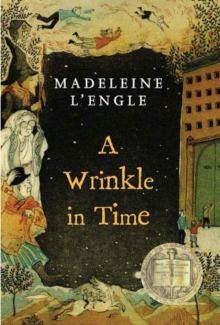 A Wrinkle in Time
A Wrinkle in Time The Young Unicorns
The Young Unicorns Two-Part Invention: The Story of a Marriage
Two-Part Invention: The Story of a Marriage The Other Side of the Sun
The Other Side of the Sun A House Like a Lotus
A House Like a Lotus Certain Women
Certain Women Many Waters
Many Waters Camilla
Camilla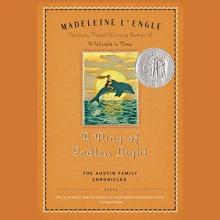 A Ring of Endless Light
A Ring of Endless Light Meet the Austins
Meet the Austins Dragons in the Waters
Dragons in the Waters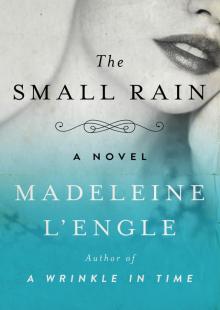 The Small Rain
The Small Rain The Moment of Tenderness
The Moment of Tenderness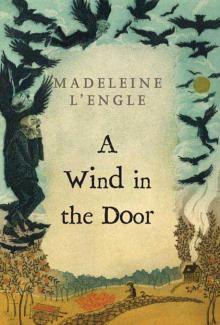 A Wind in the Door
A Wind in the Door Miracle on 10th Street
Miracle on 10th Street The Moon by Night
The Moon by Night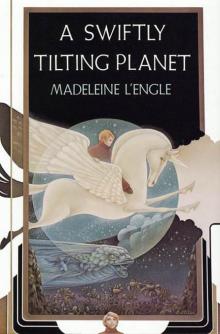 A Swiftly Tilting Planet
A Swiftly Tilting Planet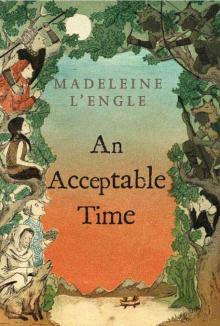 An Acceptable Time
An Acceptable Time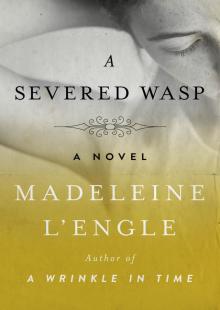 A Severed Wasp
A Severed Wasp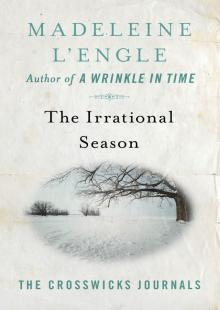 The Irrational Season
The Irrational Season A Circle of Quiet
A Circle of Quiet A Live Coal in the Sea
A Live Coal in the Sea Troubling a Star
Troubling a Star Walking on Water: Reflections on Faith and Art
Walking on Water: Reflections on Faith and Art A Wrinkle in Time Quintet
A Wrinkle in Time Quintet Wrinkle in Time
Wrinkle in Time The Wrinkle in Time Quintet
The Wrinkle in Time Quintet Intergalactic P.S. 3
Intergalactic P.S. 3 Walking on Water
Walking on Water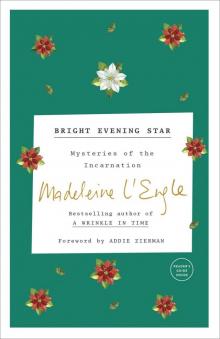 Bright Evening Star
Bright Evening Star The Rock That Is Higher
The Rock That Is Higher Madeleine L'Engle Herself
Madeleine L'Engle Herself The Arm of the Starfish
The Arm of the Starfish And Both Were Young
And Both Were Young The Twenty-four Days Before Christmas
The Twenty-four Days Before Christmas And It Was Good
And It Was Good A Stone for a Pillow
A Stone for a Pillow Do I Dare Disturb the Universe?
Do I Dare Disturb the Universe? Sold into Egypt
Sold into Egypt A Wrinkle in Time (Madeleine L'Engle's Time Quintet)
A Wrinkle in Time (Madeleine L'Engle's Time Quintet)